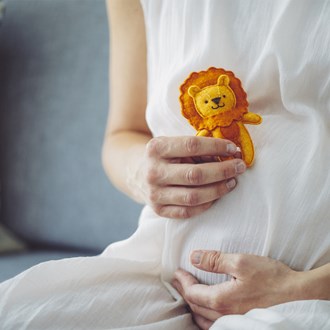When does morning sickness stop?

Our guide to understanding pregnancy nausea
By Alex Harmon
January 27 2019
When will my morning sickness stop?
Most pregnant women will experience nausea and feelings of sickness for just the first trimester, however, some women suffer through to week 20 and others right up until their due date. That's all normal.
Coinciding with the joy of discovering you’re pregnant often comes waves of nausea. Sometimes it can be so unrelenting and unbearable that you find yourself Googling 'when does morning sickness stop?' Despite the name, morning sickness can occur around the clock and happens to roughly 75 per cent of pregnant women.
What causes morning sickness?
Although morning sickness is unpleasant, uncomfortable and inconvenient, it doesn’t put you at risk of miscarriage, nor does it harm your baby. Many doctors will tell you it’s a sign of a healthy pregnancy. The thought is that sickness is connected to the hormone human chorionic gonadotrophin (hCG) that your body is producing in high levels to nourish your baby until the placenta takes over. This is why many women experience nausea in the early stages of pregnancy. The placenta starts working between 12 and 14 weeks, which can correlate with your morning sickness easing off.
The most common causes of morning sickness are:
Expecting multiples: this is linked to high levels of pregnancy hormones.
Heightened sense of smell: while this has not been proven, many believe that your heightened senses causing you to vomit is your body’s natural protective measure to stop you from eating unsafe food.
Being prone to travel sickness: if you have suffered in the past, your morning sickness could be due to a disorder in the balancing mechanism in your inner ear.
Urinary tract infections: Pregnant women are at increased risk for UTI’s and this could be the cause of your vomiting. If you also have a fever and a burning sensation when you pee, it’s best to get checked out.

What does morning sickness feel like?
The spectrum of sickness is broad. Some women feel uncomfortable and queasy, while others experience dizziness and the need to vomit several times a day. Naturally, it can be an exhausting and debilitating experience. It’s called morning sickness because it usually occurs in the mornings after waking up, but many women will tell you this is rubbish!
How long does morning sickness last?
Generally the sickness will peak at week 6 of pregnancy, after your first missed period and will end between 14-16 weeks. Some will suffer with nausea until 20 weeks or in their third trimester but this is rare, especially if you seek help from your doctor.
When to seek medical advice?
The most severe form of morning sickness is called hyperemesis gravidarum (HG) and can result in hospitalisation. You’ll know you have this if you are vomiting several times a day, are unable to keep food or water down and can barely get out of bed. Constant vomiting causes dehydration and weight loss and can affect your baby’s health, so talk to your doctor or midwife right away.
If you have pain, headaches or a fever with your morning sickness, especially if it begins suddenly after week 9, see your doctor as this could be something more serious.
What if I don’t have any morning sickness?
Some women with healthy pregnancies never experience morning sickness, so a queasy-free gestation isn’t cause for concern. However, as word of warning, other mothers may be green with envy…













